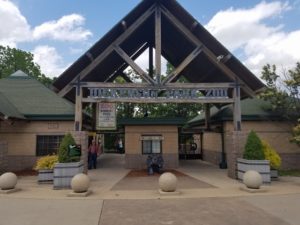
Overall Rating![]()
The Dickerson Park Zoo was founded in 1922 in Springfield, MO. The zoo has approx. 500 animals representing approx. 160 species. The zoo sits inside Dickerson Park in Springfield, Missouri. Dickerson Park Zoo is an accredited member of the Association of Zoos and Aquariums. The DPZ participates in an AZA program called the Species Survival Plan.
Dickerson Park Zoo Website: www.dickersonparkzoo.org
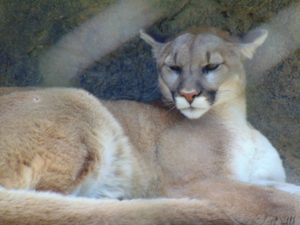
Hours:
October-March (Closed if walkways are covered in ice)
10:00am-4:00pm
April-September
9:00am-5:00pm
Closed:
Thanksgiving Day
Christmas Day
New Year’s Day
Ticket Pricing:
Adults (13-59)-$15.00
Senior (60+)-$12.00
Kids (3-12)-$10.00
Kids 2 & under-Free
Parking: Free
Pet Daycare:
Not available. Service dogs are welcome in certain areas.
With any extra service provided I would always call ahead for any information.
Restaurants:
The Bush Country Café is located near the entrance.
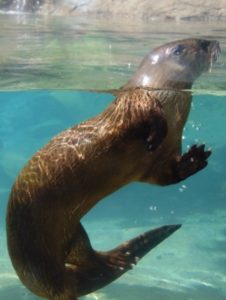
Animal Habitats![]()
Education![]()
Cultural Immersion![]()
Navigation![]()
Food Variety![]()
To view how our category ratings work click here.
Our Zoo Experience
The Dickerson Park Zoo is a medium sized zoo, which took Steve and me about half a day to walk through and see everything. I have stated in other zoo stories, Steve and I like to take our time to read all the signs and educational information.

We also like to spend time watching the animals and snapping a few good pictures. So keep that in mind when I tell you the length of our visit.
The zoo is divided into five different geographic regions. They are South America, Australia, Africa, South Asia, and Missouri USA.
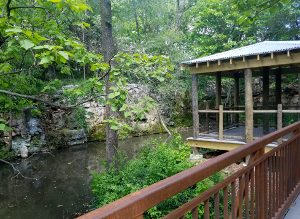
A really neat and helpful thing the zoo does is number their paths and have those corresponding numbers on the zoo map. This made it super easy to find where we were in the zoo. I recommend you do need the map to navigate so you don’t miss anything.
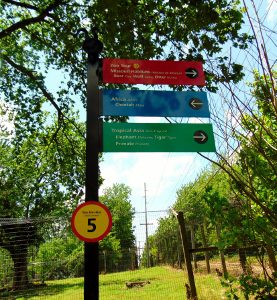
The zoo offers a concession café called the Brush Country Café. We did not eat at the zoo, instead we ate in town before we went to the zoo.

We did, however, go into the café for a drink and we looked at what they served. They have your normal concession fare. The café is located between Africa and Australia.

After paying your admission and entering the zoo, if you head left the first region you come to is Africa. If you choose instead to turn right you will be in South America.
We chose to go to Africa. The first habitat we came across was the Hippopotamus. They have two Hippos and both were enjoying their pool on the warm sunny day.
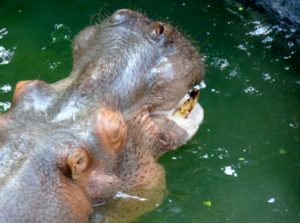
After you walk down the road a ways there is an island. On the island are Red Ruffed Lemurs.
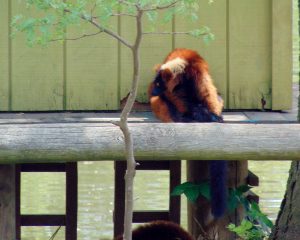
You really have to zoom your camera in to get a picture. There is a viewing area from the deck of the Conservation Station.
On down the road is the zoo herpetarium. The Zoo did a fantastic job with the cultural immersion in the herpetarium.
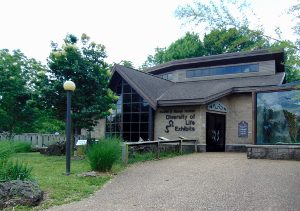
The zoo is able to show visitors different species of reptiles. They are also able to convey through cultural immersion where those species are native to.

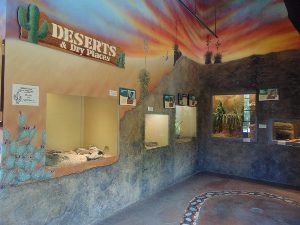
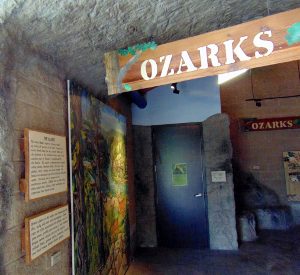
On the left side of the herpetarium is the cutest Tufted Deer. Did you know they have tiny tusks growing out both sides of their mouth?

Continuing your way down the road you encounter African Lions to your right. They were sunning and napping, not worried about anything. There are also Colobus Monkeys, Warthogs, and Zebra. This path does dead end so you do have to back track a bit.
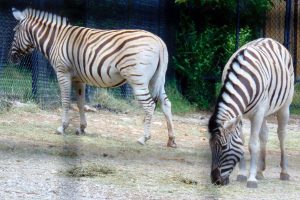
When you get back to the Lion habitat take a left and you can feed the Giraffes. Their tongues are so long!
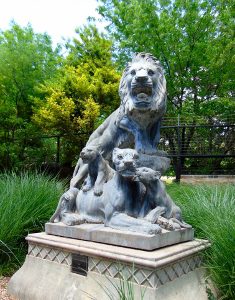
If you stay straight and turn left near the Giraffe bedrooms (barn) you can walk through there and see a Pancake Tortoise and a Lizard.
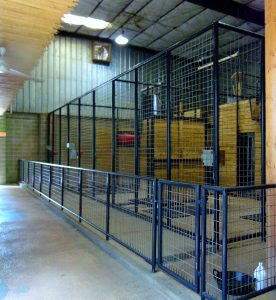
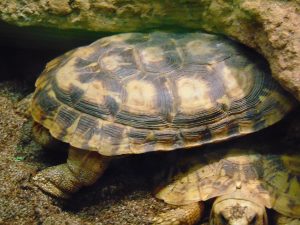
After passing the Giraffe habitat and barn you will encounter a very shy species called Bongo on your right. They live in dense forest.
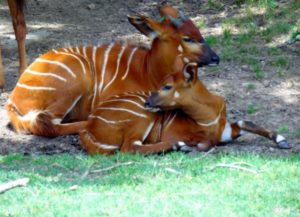
Stay on this path and make your way up the zig-zag path to the Cheetah Overlook. It is a bit of an incline, but like I said it is zig-zagged so it is a gradual incline.
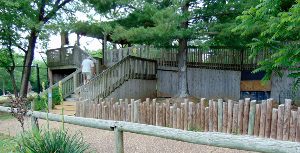
Here you can see out acoss the Cheetah habitat on one side and on the other see a different view of the Bongos.
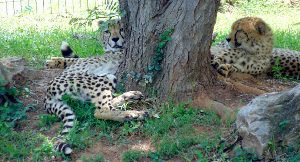
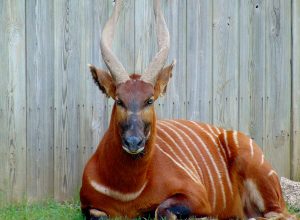
Stay on the main path (left at the fork) to enter Tropical Asia. The first habitat you come to is the Asian Elephants.
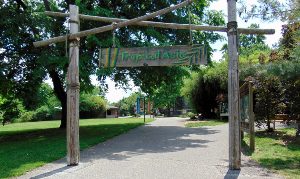
Don’t be sad if you see a lone Elephant, the zoo has a sign explaining why. Following the death of the herd matriarch in 2013 the two remaining females’ social order was disrupted and they both want to be the dominant female. They can’t be together due to this.
The zoo is working very hard every day to re-socialize the two. Until then, they spend lots of time with a male Elephant off exhibit. So don’t be worried, they are taking good care of them.
After spending some time with the Asian beauty the next animals you see are Siamang and Malayan Tigers.
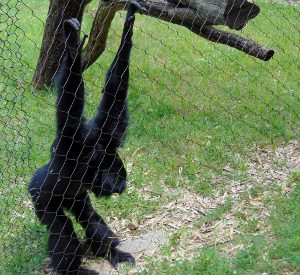
The Tiger was up and very active. She took a dip in her big pool to cool off. She stayed in there for a good while, I got some good pictures through the viewing window.
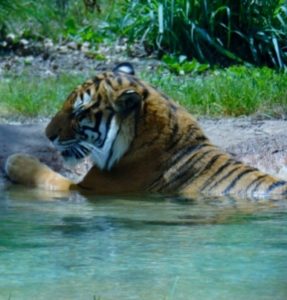
As you leave the Tigers you are also leaving Asia and traveling into Missouri. The species exhibited are native to Missouri. First are the Mexican Grey Wolves and White-tail Deer.
Then you come around a bend in the path and there are two beautiful majestic Mountain Lions (Cougars) watching you (or cat napping).
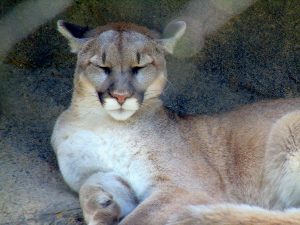
They have an awesome habitat with shade and hiding places. They also have a rock wall to climb. Mountain Lions like being up high to survey their territory.
Next up is the Bobcat habitat along with a Bald Eagle habitat.

No, not in the same one. When we visited the Bald Eagle was undergoing rehab.
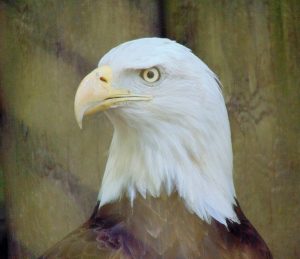
The only way zoos are able to keep Bald Eagles is when rehabilitating them. After the Bald Eagle is better they have to release him back into the wild. Unfortunately, the Bald Eagles injures rendered him flightless. He would not be able to hunt. He gets to stay at the zoo and help by being an ambassador for his species.
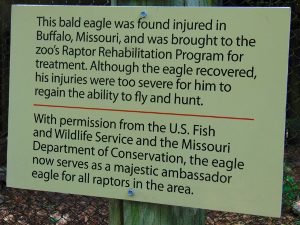
Across from the Bobcat and Bald Eagle is the North American River Otter habitat. The Otters have a good sized swimming pool and they were having a party.
There are a couple viewing windows where you can see the Otters swimming under water. The Otters would swim over and push off the window and then they would swim back and do it again.
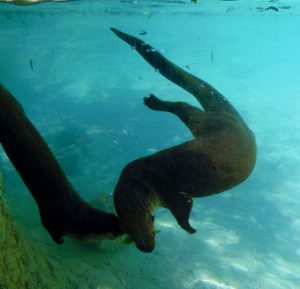
Next we walked along a boardwalk for a bit until we came across the last (or first) Missouri habitat. The first Missouri species we encountered is the Grey Fox. They are incredibly fast little Canids.
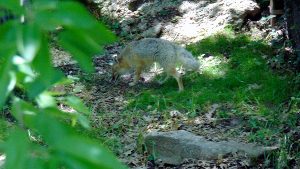
The American Black Bear. This Bear was laying across a big concrete tunnel (like a culvert) without a care in the world. He was completely content with his life.
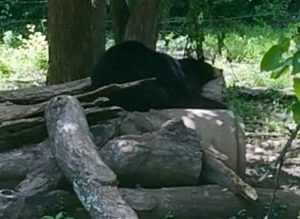
Once you leave the Black Bear you can stay left at the fork in the path and you come to the Laughing Kookaburra.
Before we made it all the way to Australia Steve had to stop at the Petting Zoo to take a selfie with a Goat.
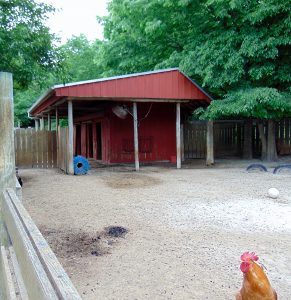
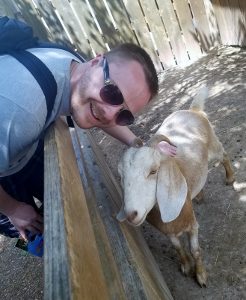
Then we were in Australia looking at Red Kangaroos laying in the sun soaking it up.
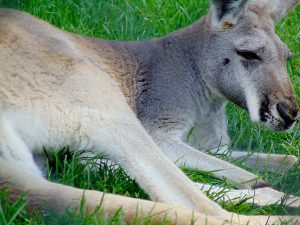
We walked through Australia right into South America.
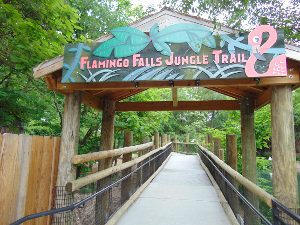
On the South American loop you encounter Parrots, Chacoan Peccary, Maned Wolf, Howler Monkeys, Spider Monkeys, Squirrel Monkeys, and Capuchin Monkeys.
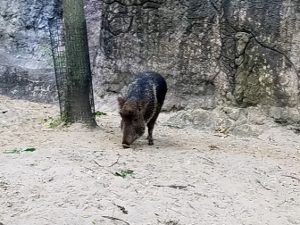
After you leave South America you are back at the zoo entrance. So let me tell you a funny story, Steve and I could hear this Peacock carrying on and on. We make a joke about him being mad at a keeper or something.
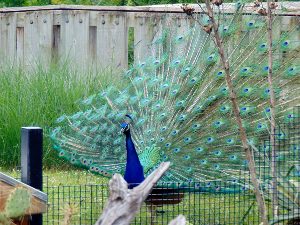
Anyway, we went in the gift shop and browsed around, we buy our magnet for our fridge and exit the zoo.
We were heading to the parking lot and all of a sudden we hear that same Peacock making a big ruckus. We turn and look back and the Peacock is on the top of the entry gate screaming.
A good laugh was had about the peacock’s screaming as we got back on the road. We were really impressed with the Missouri habitats at the zoo. I hope you enjoy it as much as we did when you visit the Dickerson Park Zoo in Springfield, MO.